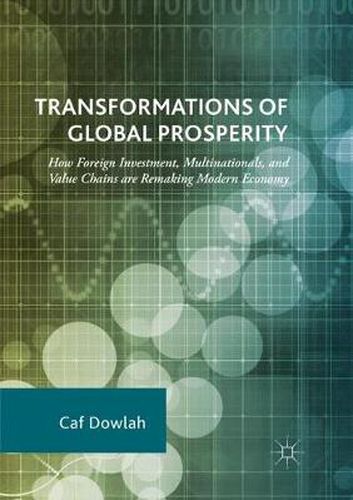Readings Newsletter
Become a Readings Member to make your shopping experience even easier.
Sign in or sign up for free!
You’re not far away from qualifying for FREE standard shipping within Australia
You’ve qualified for FREE standard shipping within Australia
The cart is loading…






This title is printed to order. This book may have been self-published. If so, we cannot guarantee the quality of the content. In the main most books will have gone through the editing process however some may not. We therefore suggest that you be aware of this before ordering this book. If in doubt check either the author or publisher’s details as we are unable to accept any returns unless they are faulty. Please contact us if you have any questions.
This book presents an in-depth understanding of the transformation of modern economy in the twenty-first century by examining the interface and interplay of three key forces of contemporary global economy-Foreign Direct Investment (FDI), Multinational Enterprises (MNEs), and Global Value Chains (GVCs)-and how the emerging nexus of these forces has already ushered in revolutionary transformation in global production, investment, trade, and employment in recent decades.
A distinctive feature of the book is that it situates the contemporary GVC revolution-that envisages fragmentation and dispersion of production processes across the world based on competitive costs and quality-as a natural progression of the traditional FDIs-MNEs nexus, which emphasized internationalization of production and trade in search of profits, resources, markets, or cheap labour. Moreover, the book provides a comprehensive analysis, from historical, theoretical and empirical perspectives, of both traditional FDIs-MNEs Nexus that dominated the world economy until the end of the twentieth century, and of the New Nexus of FDIs-MNEs-GVCs, that has opened grand opportunities for global prosperity by providing short-cut paths to industrialization and economic growth for less developed countries.
As an exemplar, the book examines GVCs in automobiles-a medium-tech manufacturing activity with numerous backward and forward linkages-to demonstrate how the FDI-MNE-GVC interface in this sector has wedged industrialization, employment, and trade in six emerging countries/regions-Brazil, Central and Eastern Europe, China, India, Mexico and Thailand.
$9.00 standard shipping within Australia
FREE standard shipping within Australia for orders over $100.00
Express & International shipping calculated at checkout
This title is printed to order. This book may have been self-published. If so, we cannot guarantee the quality of the content. In the main most books will have gone through the editing process however some may not. We therefore suggest that you be aware of this before ordering this book. If in doubt check either the author or publisher’s details as we are unable to accept any returns unless they are faulty. Please contact us if you have any questions.
This book presents an in-depth understanding of the transformation of modern economy in the twenty-first century by examining the interface and interplay of three key forces of contemporary global economy-Foreign Direct Investment (FDI), Multinational Enterprises (MNEs), and Global Value Chains (GVCs)-and how the emerging nexus of these forces has already ushered in revolutionary transformation in global production, investment, trade, and employment in recent decades.
A distinctive feature of the book is that it situates the contemporary GVC revolution-that envisages fragmentation and dispersion of production processes across the world based on competitive costs and quality-as a natural progression of the traditional FDIs-MNEs nexus, which emphasized internationalization of production and trade in search of profits, resources, markets, or cheap labour. Moreover, the book provides a comprehensive analysis, from historical, theoretical and empirical perspectives, of both traditional FDIs-MNEs Nexus that dominated the world economy until the end of the twentieth century, and of the New Nexus of FDIs-MNEs-GVCs, that has opened grand opportunities for global prosperity by providing short-cut paths to industrialization and economic growth for less developed countries.
As an exemplar, the book examines GVCs in automobiles-a medium-tech manufacturing activity with numerous backward and forward linkages-to demonstrate how the FDI-MNE-GVC interface in this sector has wedged industrialization, employment, and trade in six emerging countries/regions-Brazil, Central and Eastern Europe, China, India, Mexico and Thailand.